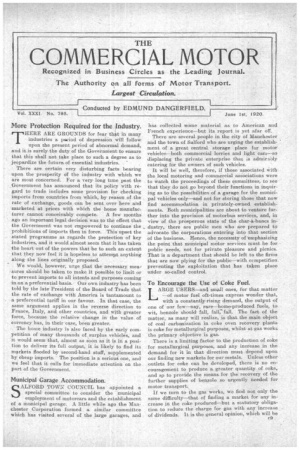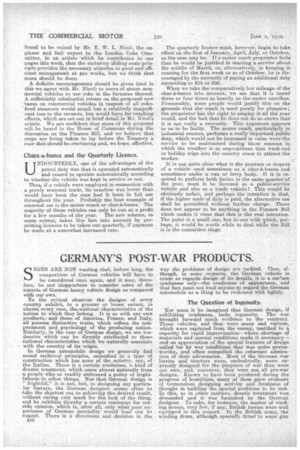More Protection 'Required for the Industry.
Page 1

Page 2

If you've noticed an error in this article please click here to report it so we can fix it.
THERE ARE GROUNDS for fear thit in many industries a period of depression will follow upon the present period of abnormal demand, and it is surely the duty of the Government to ensure that this shall not take place to Such a degree as to jeopardize the future of essential industries.
There are certain very disturbing facts bearing upon the prosperity of the industry with which we are most concerned. For a very long time past the Government has announced that its policy with regard to trade inchides some provision for checking imports from countries from which, by reason. of the rate of exchange, goods can be sent over here and marketed at prices with which the home manufacturer cannot conceivably compete. A few months ago an important legal decision was to the effect that the. Government was not empowered to continue the prohibitions of imports then in force. This upset the stated programme as regards the protection of key industries, and it would almost seem that it has taken the heart out of the powers that be to such an extent that they now feel it is hopeless to attempt anything along the lines originally proposed.
We would, however, urge that the necessary plea, ,sures should be taken to make it possible to limit or to prevent imports to all intents and purposes coming in on a preferential basis. Our own industry has been told by the late President of the Board of Trade that the rate of exchange with America is tantamount to a preferential tariff in our favour. In that case, the same argument applies in the reverse direction to France, Italy, and other countries, and with greater force, because the relative change in the value of currency has, in their ease, been greater. The home industry is also faced by the early competition of many thousands of surplus vehicles, and it would seem that, almost as soon as it is in a position to deliver its full output, it is likely to find its markets flooded by second-hand stuff, supplemented by 'cheap imports. The position is a seriouS one, and we feel that it calls for immediate attention on the part of the Government..
Municipal Garage Accommodation.
SALFORD TOWN COUNCIL has appointed a special committee to consider the municipal employment of motorcars and the establishment of a municipal garage. A little while ago the Manchester Corporation formed a similar committee which has visited several of the large garages, and has collected iscime material, as to American and French experience—but its report is yet afar off. There are several people in the city of Manchester and the town of Salford who are urging the establish ment of a great central storage place for motor vehicles—both commercial lorries and light cars--so displacing the private enterprise that is admirably catering for the owners of such vehicles. It wilt be well, therefore, if those associated with the local motoring and commercial associations were to watch the proceedings of these committees,: to see that they do not go beyond their functions. in inquiring as to the possibilities of a garage for the munici pal vehicles only—and not for storing those that now find accommodation in privately-owned establishments. Both municipalities are about to venture further into the provision of motorbus services, and, in view of the prosperous state of the char-it-banes dustry, there are public men who are prepared to advocate the corporations entering into that section of the business. Hence, the necessity of emphasizing the point that municipal motor services must be for • public needs, not for private pleasure and picnics. That is a department that should be left to the firms that are now plying far the public—with competition. preventing the exploitation that has taken place under so-called control.
To Encourage the Use of Coke Fuel.
ARGE USERS—and small ones, for that matter —of motor fuel oft-times express wonder that, with a constantly-rising demand, the output of one of our fewnay, rare—home-produced fuels, to wit, benzole should fall, fall; fall. The fact of the matter, as many will realize, is that the main object of coal carbonization in coke oven recovery plants is coke for metallurgical purposes, whilst at gas works the primary objective is gas. There is a limiting factor to the production of coke for metallurgical purposes, and any increase in the demand for it in that direction mustdepend upon our finding new markets for our metals. Unless other outlets for coke can be developed, there is no encouragement to produce a. greater quantity of coke, and so to provide the means for the recovery of the further supplies of benzole so urgently needed for motor transport.. If we turn to the gas works, We find not only the same difficulty—that of finding a market for any increase in the coke produced—but a statutory obligation to reduce the charge for gas with any increase of dividends It is the general opinion, which will be found to be voiced by Mr. E. W. L. Nicol, the engineer and fuel expert to the London Coke Committee in an article which he contributes to our pages this week, that the statutory sliding scale principle provides the necessary stimulus.to good and efficient management at gas works, but we think that more should be done.
A definite encouragement should be given (and in this we agree with Mr. Nicol) to users of steam commercial vehicles te use coke in the furnaces thereof. A sufficiently substantial rebate on the proposed new taxes on commercial vehicles in respect of all cokefired steamers would entail but a relatively insignificant loss to the revenue, but would have far-reaching effects, which are set out in brief detail in Mr. Nicol's article. We are confident that more of this proposal will be heard in the 'House of Commons during the discussion on the Finance Bill, and we believe that steps are being taken to lay before the Treasury a case that should be convincing and, we hope, effective.
Chars-a-bancs and the Quarterly Licence.
UNDOUBTEDLY, one of the advantages of the petrol duty was that it operated automatically and ceased to operate automatically according to whether the vehicle was kept in service or not.
Thus, if a vehicle were employed in connection with a purely seasonal trade, its taxation was hewer than would have been the case had it been in full use throughout the year. Probably the best example of seasonal use is the motor coach or char-h-bancs. The majority of these vehicles can only be run at a profit for a. few months of the year. The new seheine, to some extent, takes this fact into account by permitting licences to be taken out quarterly, if payment be made at a somewhat increased rate.
The quarterly licence must, however, begin to take effect on the first. of January, April, July, or October, as the case may be. If a motor coach proprietor feels that he would be justified in starting .a service about the middle of March, or, alternatively, in: keeping it running for the first week or so of October, he is discouraged by the necessity of paying an additional duty amounting to £15 or £20..
When we take the comparatively low mileage of the char-a-banes into account, we see that it is taxed three or four times as heavily as the motor omnibus. Presumably, some people would justify this on the grounds that the coach is used purely for pleaeure; the proprietor has the right to employ it all the year round, and the fact that he does not do so shOws that it is not really a necessity. Thisargument appears to us to be faulty. The motor coach, particularly in industrial centres, performs a really important public duty, which would net be increased in value were the service to be maintained during those seasons in which the weather is so unpropitious that week-end or holiday trips into the country cease to attract the worker.
It is not quite clear what is the position in respect of a vehicle used semetimee as a char-A-basica and sometimes' under a van, or lorry body. If it is required to perform bath dutiesin the same quarter of the year, must it be licensed as a public-service vehicle and also as a trade vehicle ? This would be obviously unfair, and perhaps the intention is that, if the higher scale of duty is paid, the alternative use shall be permitted without further charge.There does not appear to be anything in the Finance Bill which makes it clear that this is the real intention. The point is a small one, but is one with which, perhaps, it would be worth while to deal eehle the Bill is in the committee stage.




























